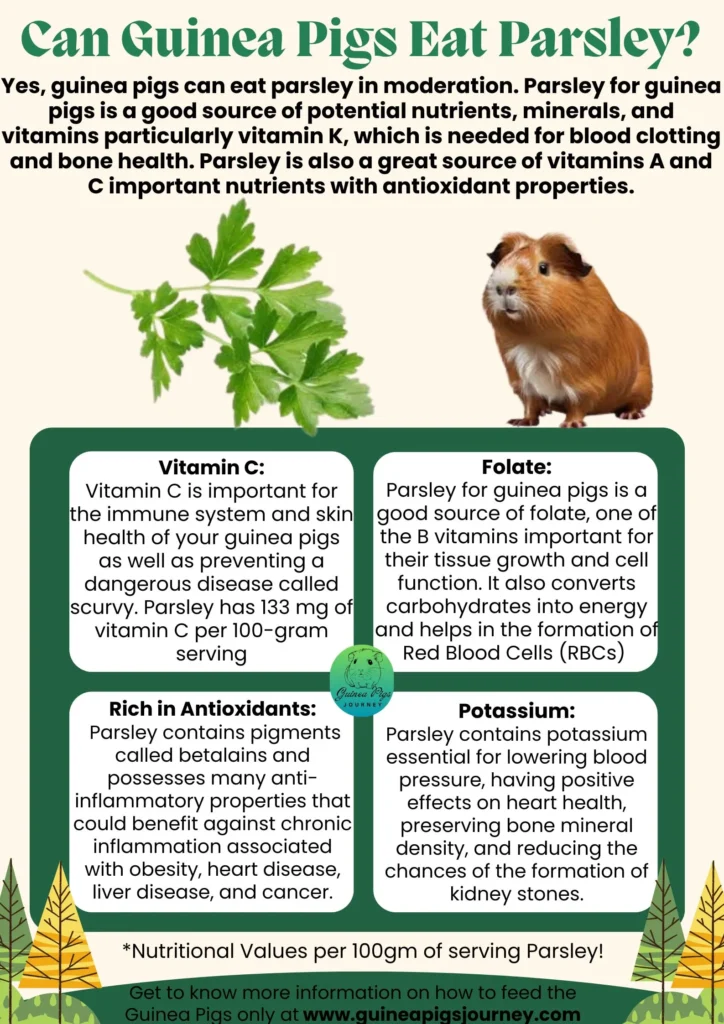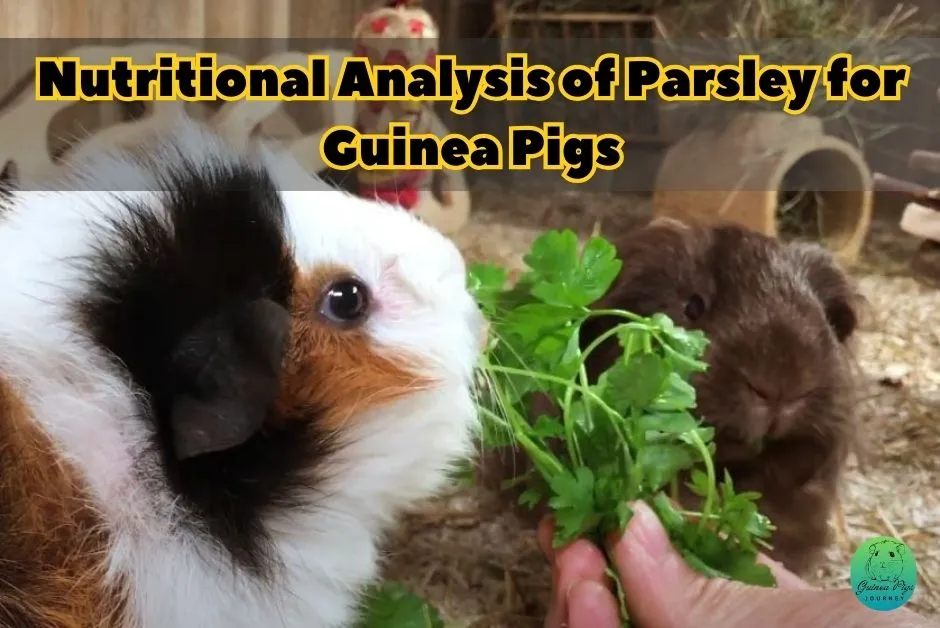Parsley! An impressive herb like cilantro or coriander, basil, rosemary, thyme, etc. with numerous health benefits used to treat conditions like high blood pressure, allergies, gastrointestinal disorders, skin conditions, bladder or kidney stones, and inflammatory disease. Such a good food with many benefits raises questions for our little furry friends: Can guinea pigs eat parsley? And if they can eat parsley, do they like it? And how often can guinea pigs eat parsley? Let’s know and understand these questions and more about parsley for guinea pigs.
The quick answer is yes, guinea pigs can eat parsley in moderation, and according to the Humane Society, leafy greens like romaine lettuce, mustard greens, cilantro, and parsley should make up the bulk of your guinea pigs fresh diet. Parsley for guinea pigs is a good source of potential nutrients, minerals, and vitamins particularly vitamin K, which is needed for blood clotting and bone health. Parsley is also a great source of vitamins A and C important nutrients with antioxidant properties.
Although parsley for guinea pigs is a nutrient-dense herb beneficial for their overall health and body function, it can also be harmful if fed excessively due to the excessive amount of nutrients consumed by our guinea pigs. So, it is equally important to know about all these nutritional benefits, risks, considerations, and other factors of parsley for guinea pigs. So let’s ride on a guinea pig journey to make a responsible decision in feeding your guinea pigs.
Nutritional Requirements of Guinea Pigs:
Guinea pigs require a proper diet plan to fulfill their nutritional requirements. They have a susceptible and delicate digestive system which requires extra care and understanding of their nutritional needs to keep them healthy and fit. The list of safe food that can be fed to guinea pigs is so long that needs great care to know the best way of feeding guinea pigs. But not all foods your guinea pigs eat are safe, like jalapenos peppers, pickles, cheerios, olives, meat, etc.; some are toxic and harmful to their health and digestive system. So, you must also know about those foods not recommended to feed guinea pigs for their safe and healthy life.
In general, Guinea pigs require good and fresh quality hay which makes up 80-90 % of most of their diet along with 10 % of fresh and good quality fruits and vegetables such as sugar snap peas, broccoli, Swiss chard, asparagus, arugula, dandelions, basil, rosemary, pears, honeydew melon, cherries, plums, etc. as a treat in moderation.
Guinea pigs can also be served with some amount of only dedicated guinea pig pallets but it should not be part of their main staple and should be served the recommended portion or mentioned on pallets bag for guinea pigs. Guinea pigs should also be served with fresh, clean, chlorine-free drinking water at all times and must be checked and changed twice a day for their good health.

Parsley for guinea pigs can be a nutritious addition if offered in moderation but at the same time, it can be harmful and dangerous with excessive feeding. So, you must know the nutritional analysis of all parts of parsley for guinea pigs so that you can decide on the quantity and portion of serving as well as the values and percentage of nutrients available with parsley for guinea pigs to ensure moderation.
Nutritional Analysis of Parsley for Guinea Pigs:
According to the USDA food database, Parsley is rich in antioxidants and vitamins A, K, and C. It maintains blood sugar levels and supports cardiovascular, renal, and skeletal health. Listed below are the nutritional values and percentages per 100 grams of raw parsley for guinea pigs to understand the values and percentages of these important nutrients parsley for guinea pigs contain and how much parsley is too much for a guinea pig for optimum health benefits.

| Nutrients | Value per 100 grams | Daily Value (DV %) |
| Calories | 36 kcal | |
| Carbohydrates | 6.33 grams | 2 % |
| Water | 87.7 grams | |
| Fat | 0.79 gram | 1 % |
| Protein | 2.97 grams | 6 % |
| Dietary Fiber | 3.3 grams | 12 % |
| Sugar | 0.85 gram | |
| Ash | 2.35 grams | |
| Net Carbs | 6.6 grams | |
| Vitamin C, total ascorbic acid | 133 mg | 148 % |
| Vitamin A, RAE | 421 µg | 47 % |
| Vitamin K | 1640 µg | 1367 % |
| Vitamin B6 | 0.09 mg | 5 % |
| Vitamin D | 0 mcg | 0 % |
| Cholesterol | 0.00 mg | 0 % |
| Fatty Acid | 0.132 g | 1 % |
| Calcium, Ca | 138 mg | 11 % |
| Phosphorus, P | 58 mg | 58 % |
| Potassium, K | 554 mg | 12 % |
| Iron, Fe | 6.2 mg | 34 % |
| Magnesium, Mg | 50 mg | 12 % |
| Zinc, Zn | 1.07 mg | 10 % |
| Sodium, Na | 56 mg | 2 % |
| Copper, Cu | 0.149 mg | 17 % |
| Folate | 152 µg | 38 % |
Note: * The % Daily Value (DV) indicates how much a nutrient in a serving of food subsidizes a daily diet.
Is Parsley Safe For Guinea Pigs?
Yes, parsley is safe for guinea pigs yet low in calories and sugar and high in vitamins C and A as well as other important minerals like iron, potassium, and calcium making a healthy nutritional addition to their diet plan. However, parsley is also high in calcium and oxalate content which can be a concern if consumed excessively contributing to the formation of bladder and kidney stones. So, it is very crucial to offer this herb in moderation to ensure the proper intake to keep your guinea pigs healthy and fit.

It is always recommended to monitor or watch for any kind of allergic signs before introducing parsley into your guinea pig diet. Do not hesitate to give a call to your veterinarian for a review and medical checkup of each guinea pig to maintain a healthy life, especially if they have had problems in the past.
What Are the Nutritional Benefits of Parsley For Guinea Pigs?
Parsley for guinea pigs proves to be a nutrient-rich leafy green that may enhance their health in a variety of ways, such as reducing inflammation, improving blood sugar control, boosting immunity promoting heart health, etc. Let’s know what type of nutrients and their benefits parsley contains for guinea pigs.

Vitamin C:
Parsley for guinea pigs contains 133 mg of vitamin C per 100 grams serving of parsley beneficial for the prevention of a dangerous disease called scurvy in guinea pigs which can even lead to malnutrition and sometimes can also cause death. Just like humans, guinea pigs cannot produce their vitamin C and require an external source like rosemary which is also a good source of vitamin C for guinea pigs. Vitamin C also helps guinea pigs build a strong and secure immune system that can fight against many viruses and bacteria to keep guinea pigs safe and healthy.
Vitamin A:
Parsley for guinea pigs contains 421 µgof vitamin A per 100-gram serving of parsley which is beneficial for the skin, tissues, or eyesight development. Guinea pigs require vitamin A, especially in times of any type of injury for the development of skin cells and tissues. Vitamin A for guinea pigs also helps to protect against the free radicals which can cause many diseases including cancer in guinea pigs.
Vitamin K:
Parsley is packed with vitamin K is an essential nutrient for bone health. Vitamin K helps build stronger bones by supporting bone-building cells called osteoblasts. This vitamin also activates certain proteins that increase bone mineral density and is linked to a reduced risk of fractures for guinea pigs. Parsley for guinea pigs contains 1640 µgof vitamin K per 100-gram serving of parsley.
Iron:
Iron plays a key role in oxygen transport and storage in the human as well as guinea pig body. Iron is a part of hemoglobin protein which is contained in red blood cells responsible for oxygen transport and carbon dioxide removal in organs and tissues of guinea pigs. Parsley for guinea pigs contains 6.2g of Iron per 100-gram serving of parsley.
Antioxidants: Parsley is a good antioxidants that help support the immune health of guinea pigs and important to note that rosemary does not contain sugar which is good news but moderation is the key to serving. The main antioxidants in parsley are flavonoids, carotenoids, and, vitamin C.
What Are The Risks Of Parsley For Guinea Pigs?

Risk of Bladder Stones:
Parsley is higher in calcium than other leafy greens which is a point of concern when deciding to offer the amount of parsley in your guinea pig diet. Calcium is also necessary for guinea pigs’ health protecting their bones, teeth, etc. but excessive consumption can contribute to the formation of bladder stones. Adult guinea pigs require less calcium intake than young guinea pigs, so it requires great care to feed food high in calcium to avoid any hazard or formation of bladder stones which can be very painful for your furry friends.
Risk of Oxalate causing Kidney Stones:
Parsley also has oxalate content which is also a serious concern while offering the amount of parsley to your guinea pigs. However, parsley is not too high in oxalates, which are a contributing factor to the formation of kidney stones in guinea pigs. Kidney stones can be very painful for your guinea pigs’ overall health causing urinary tract issues and bleeding in their pee as well as urinary tract.
Diarrhea:
One of the common problems seen in guinea pigs is diarrhea which can be fatal if not treated immediately. Due to their sensitive digestive system, offering too much parsley at a single time can be very dangerous causing diarrhea due to the nutritional imbalance and excessive feeding. So, it is always suggested to start with a small amount if it is their first time or new food for your guinea pigs and introduce it gradually and in moderation to avoid any kind of complication or risk factor.
Allergic Reaction:
Watch out for any kind of possible allergic reaction before and after feeding parsley that can cause discomfort due to parsley for guinea pigs. It depends on Individual guinea pigs, some may be allergic to parsley and some may adjust it very easily. It is very important for guinea parents to consult a vet before introducing any new food or herb like parsley to guinea pigs’ diet and always monitor the reaction or any change in guinea pig’s behavior if you introduce any new food to the guinea diet, then immediately contact your veterinarian for further guidance.
How Often Can Guinea Pigs Eat Parsley? (Frequency and Size of Serving Parsley)

Ensuring moderation in guinea pigs’ diet is very crucial and this part of the question will make you understand the importance of the moderation process. Let’s understand the Frequency and size/portion of serving parsley for guinea pigs.
The recommended frequency and portion of serving parsley is almost 10-20 stems of parsley for elder and healthy guinea pigs whereas younger guinea pigs may be served with less amount of about 5-8 parsley springs per serving in moderation, per guinea pig, and no more than 2-3 times a week while considering other fruits and veggies in their diet to make a suitable and balanced diet chart for guinea pigs.
You can also mix parsley with other fresh leafy greens and veggies low in calcium and high in vitamin C and other nutrients like cilantro, mustard greens, green beans, bell peppers, mushrooms, parsnips, radicchio, romaine lettuce, wheatgrass, zucchini, etc. to make it a good treat for your lovely pet while considering the amount and portion of serving by ensuring moderation as a rule of thumb.
Can Guinea Pigs Eat Parsley Every Day?
No, it is not recommended to feed parsley to your guinea pigs every day due to its high calcium and oxalate content which can contribute to the formation of kidney stones in guinea pigs. Parsley should be offered in moderation to avoid any kind of risk like urinary tract issues, digestive issues, diarrhea, bloating, allergic reactions, etc. for guinea pigs.

Which Parts of Parsley Can Guinea Pigs Eat?
Although guinea pigs love to eat this leafy green in moderation. However, an important question comes to mind while offering this herb to guinea pigs can guinea pigs eat all parts of parsley? Let’s have a look at whether parsley and its parts are safe to feed your guinea pigs.

Can Guinea Pigs Eat Parsley Leaves?
Yes, guinea pigs can eat the parsley leaves in moderation as a key to feeding. Parsley leaves are the main component that can be fed to your guinea pigs after washing them properly in cold running water to remove any dust, pesticides, or chemicals. Parsley leaves Contain important plant compounds that have antioxidant, anti-inflammatory, and other health properties.
Can Guinea Pigs Eat Parsley Stems/Stalks?
Yes, guinea pigs can eat the stems/stalks of Parsley in moderation which adds additional nutritional benefits as it also contains more fiber than parsley leaves, important antioxidants, and other nutrients beneficial for your guinea pigs.
Ensure that parsley stems or stalks are not overly wilted and molded, always provide your guinea pigs with fresh and organically produced parsley leaves and stalks or stems which would be much more nutritious for them.

Can Guinea Pigs Eat Parsley Flowers?
Yes, guinea pigs can eat parsley flowers in moderation. Parsley flowers also provide numerous health benefits rich in vitamins, minerals, and antioxidants, such as vitamin K, vitamin A, and beta-carotene, which can benefit the health of guinea pigs.
Can Guinea Pigs Eat Parsley Roots?
Yes, guinea pigs can eat parsley roots in moderation and small quantities after washing them properly in cold running water to remove dust and pests. Parsley roots are also high in fiber, antioxidants, and essential minerals necessary for guinea pigs’ nutritional requirements and boosting their digestion system and liver function.
Can Guinea Pigs Eat Parsley Flakes?
No, do not feed parsley flakes to your guinea pigs which can cause serious digestive problems for them because it contains some added preservatives and ingredients that are bad for your guinea pigs’ overall health.
Can Guinea Pigs Eat Dried Parsley?
No, it is not recommended to offer dried parsley to your guinea pigs as it does not have many more nutrients than the fresh and raw parsley provides for your guinea pigs.
Can Guinea Pigs Eat Parsley Seeds?
No, parsley seeds are not recommended to feed your guinea pigs as they can choke on your guinea pigs causing hazardous situations, so it is better to avoid them. Parsley seeds are not much more nutritious for your guinea pigs and other alternatives can be served to your furry friends.
Which Type of Parsley Can Guinea Pigs Eat?
Can Guinea Pigs Eat Italian Parsley?
Yes, Italian parsley also known as flat-leaf parsley as well as the curly varieties is safe to feed your guinea pigs as it is one of the most used varieties of parsley and is very popular. Italian parsley is also rich in important minerals, vitamins, and antioxidants beneficial for the guinea pigs’ overall health.
Can Guinea Pigs Eat Cow Parsley?
This is a curly or flat-leafed parsley variety that is also safe to feed your guinea pigs but in moderation.

Can Guinea Pigs Eat Chinese Parsley?
Chinese parsley is another name for cilantro or coriander which is a variety of parsley that can be fed to your guinea pigs in moderation. Chinese parsley is a great source of vitamins C, A, and K as well as antioxidants.
Can Guinea Pigs Eat Frozen Parsley?
No, do not feed frozen parsley directly from the freezer, make them cool down at room temperature before serving your guinea pigs. Frozen parsley can cause stomach upset which can affect their overall health. Serving frozen parsley is not the ideal form to offer them. Freezing parsley can cause changes in texture and flavor, and guinea pigs may not find it as appealing as fresh parsley. Additionally, freezing can lead to the breakdown of some nutrients over time.
Can Guinea Pigs Eat Cooked or Processed Parsley?
No, do not feed your guinea pigs cooked or processed parsley because it contains seasonings, salts, oil, etc. which can be harmful to guinea pigs’ digestive system causing stomach upset, bloating, vomiting, etc. It is recommended to serve fresh, raw, and organically produced parsley for guinea pigs.
Alternatives of Parsley for Guinea Pigs:
Although guinea pigs enjoy parsley in their diet still some individual guinea pigs may like or dislike the parsley in their diet, so there must be an alternative to this herb in their diet to fulfill nutritional requirements. Listed below are some herbs as an alternative to parsley for guinea pigs.

| Basil, raw | Kale, raw | Jicama | Pomegranate |
| Pumpkin, raw | Kohlrabi, raw | Beets | Tomatillos, raw |
| Rutabagas, raw | Cilantro | Butternut Squash | Spinach, raw |
| Endive, raw | Pumpkin seeds | Blackberries | Grapefruit |
| Nectarines | Parsnips | Wheatgrass | Dragon Fruit |
Overall, it is safe to feed Parsley to your Guinea Pigs:
Always remain up to date for any type of new food including parsley before introducing to the Cavies diet plan. Remember, moderation and gradual introduction are the keys to serving any food and observing or monitoring the guinea pig’s reaction and behavior change or physical response to food. Do not hesitate to give a call to a professional veterinarian in case of any harmful effects or guidance.







